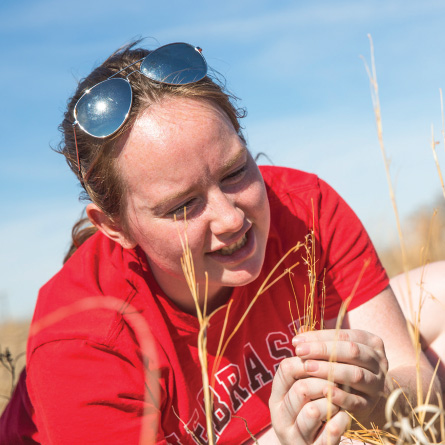ecological sustainability and resilience Grassland Ecology & Management Option

This option focuses on the management of rangeland, the world's most abundant type of land. About 45 percent of the world's land area and half of Nebraska's is classified as rangeland. These are ecosystems made up primarily of grassland that involve complex relationships among plants, animals, microorganisms, and nonliving factors such as soil, water and climate.
The program is offered through the Center for Grassland Studies, where you will study basic sciences, natural resources and range science. Specialized courses may include forage crop and range management, range management and improvement, wildlife biology and conservation, range ecosystems, integrated resource management, range plants and rangeland analysis.
Rangelands have many uses, most commonly as a forage base for the large livestock industry. Proper range management is essential for sustaining livestock systems, biodiversity, wildlife habitat, quality recreation areas and watershed integrity. Effective range management conserves renewable resources and is a promising career dedicated to the sustenance of a crucial ecological system.

Meet the Grassland Ecology & Management Team
Scholarships
The Center for Grassland Studies has several funds available to provide Academic and Professional Development scholarships for eligible undergraduate students pursuing a degree in grassland management and stewardship. The Center and our students are very fortunate to have donors passionate about the Nebraska grasslands and committed to the education of our future professionals and grassland stewards. Deadline for scholarships is March 15.
Range Management Club
The Range Management Club exists to: foster advancement in the science and art of range ecosystem management; stimulate discussion and understanding of scientific and practical range and pasture problems; provide a medium for exchange of ideas and facts among club members and range scientists; and attend annual meetings of the Nebraska and International Society for Range Management where students participate in student activities, including the Undergraduate Range Management Exam, Range Plant Identification Contest, Undergraduate Public Speaking Contest, and the Undergraduate Student Paper Session.
Professional Societies
Most clubs are chapters of professional societies. The annual highlight for many students is attending these professional meetings where there is a focus on student activities, including student contests, social events, and special sessions on job placement and career development. Membership in relevant societies is encouraged, especially for students in the Grassland Systems degree program. Many professional societies have reduced membership fees for students.
- American Horticultural Society
- American Society of Animal Science
- American Registry of Professional Animal Scientists
- Agricultural & Applied Economics Association (AAEA)
- American Society of Agronomy (ASA)
- Crop Science Society of America (CSSA)
- Society for Range Management (SRM)
- Soil Science Society of America (SSSA)




